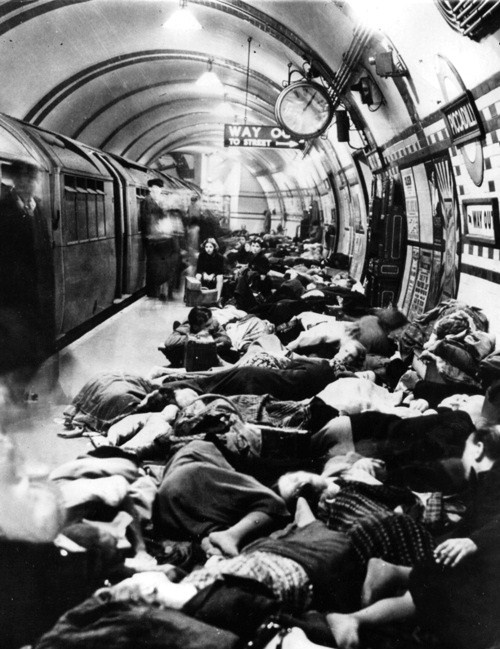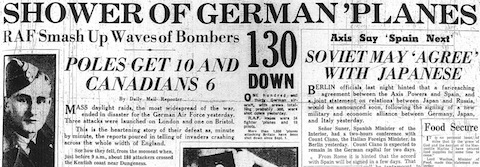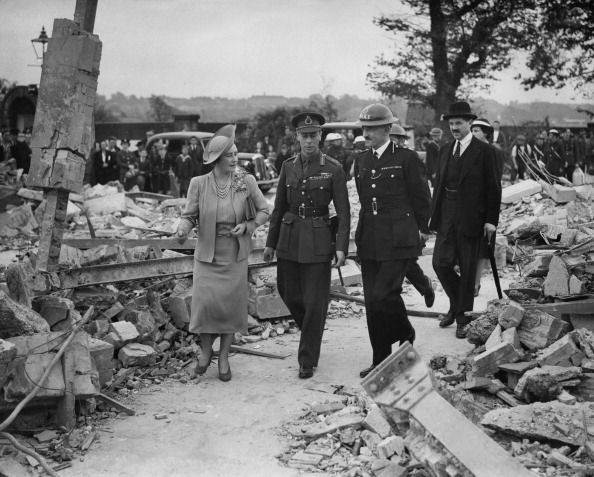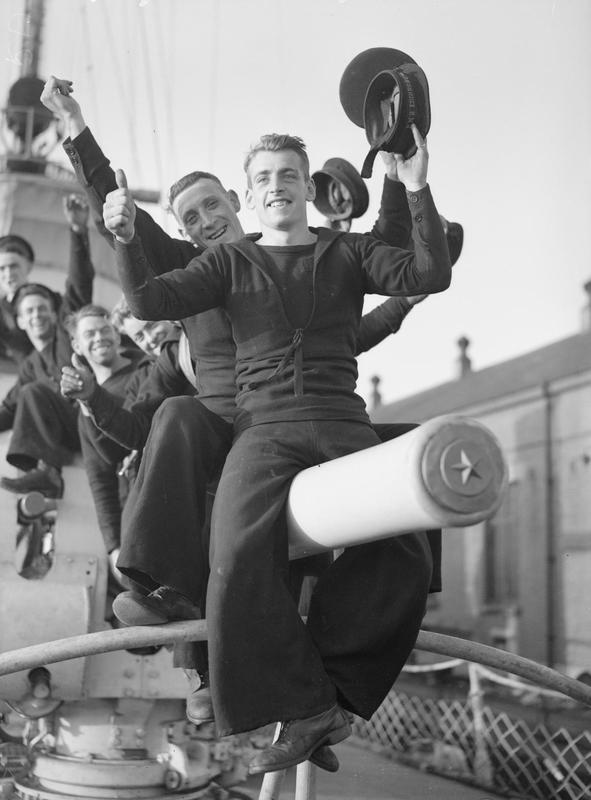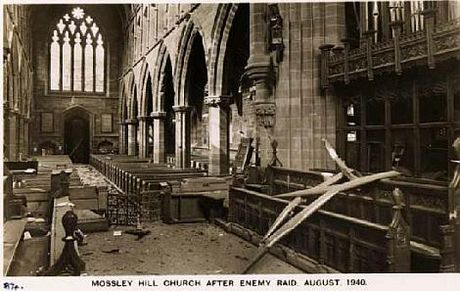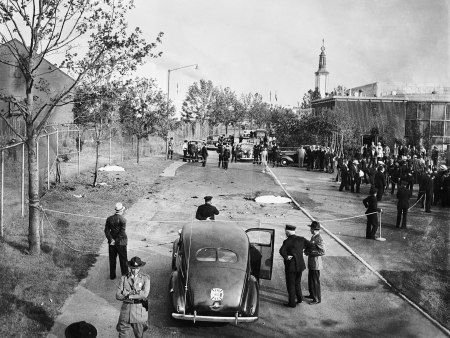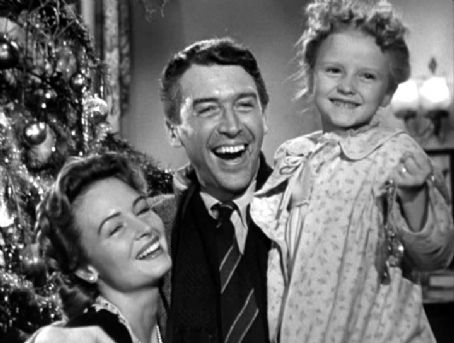Thursday 9 January 1941
 |
| "Prime Minister Winston Churchill inspects the 1st American Squadron of the Home Guard on Horse Guards Parade, London, on 9 January 1941." © IWM (H 6547). |
The Italians frantically deploy the Lupi di Toscana division immediately after a 24-hour forced march in a blizzard. The Toscana has no maps, has not reconnoitered the terrain, and is not in communication with the Julia Division. The Greek 11th Division joins the 15th Division in its attacks on the right flank and makes good progress, surrounding part of the Toscana. The Julia Division begins pulling back from the pass. It is another absolute fiasco for the Italian military.
Four Italian destroyers (Ascari, Carabiniere, Folgore and Fulmine) shell Greek bases at Porto Palermo, Albania.
Despite the continuing Greek success against the hapless Italian military, everyone is looking over their shoulders toward the German forces assembling in Romania and Bulgaria - for "training."
European Air Operations: The Malta-based Wellingtons raid Messina. Damage is done to oil facilities, but they miss the ships in the harbor.
RAF Bomber Command hits scattered targets in northwest Europe, including another attack on the oil facilities at Gelsenkirchen, Dusseldorf, Duisburg-Ruhrort, and various invasion ports such as Rotterdam, Flushing, Dunkirk, and Calais. Coastal Command chips in with attacks on Brest, where the Admiral Hipper continues to linger. The Luftwaffe night fighter forces continue gaining experience, as Oblt. Reinhold Eckhardt of 6./NJG 1 destroys a British Whitley bomber over Nijmegen.
The Luftwaffe continues its period of primarily sporadic daylight raids by lone raiders, with small raids against London (67 aircraft) and Liverpool during the night. The major raid is against Manchester with about 143 bombers total.
 |
| Italian bombers in Albania/Greece, 9 January 1941 (AP Photo). |
Italian submarine Glauco claims that it shells a large freighter just south of where U-105 is operating and makes some hits. However, it is unknown what ship this may be.
Royal Navy 40 ton drifter Dusky Queen runs aground and is wrecked in the Dover Straits.
British 646 ton freighter Dorset Coast hits a mine and is damaged south of Cardiff in the Bristol Channel. The ship makes it to Penarth Dock.
The Luftwaffe raids Portsmouth dockyard and slightly damages minesweeper Saltburn with a near miss.
The Royal Navy intercepts French trawler Urania in the Atlantic west of Gibraltar. The Urania is seized and sent to Gibraltar. The Urania has been en route from Saint Pierre et Miquelon off Canada to Casablanca.
Convoy FS 384 departs from Methil.
Royal Navy corvette HMS Pimpernel (K 71) and destroyer RNoN Bath (I-17) are commissioned.
U-410 is laid down.
 |
| "Pilots of No. 601 (County of London) Squadron run to their waiting Hurricane aircraft at RAF Northolt, 9 January 1941. Squadron scramble staged for General 'Hap' Arnold, USAAF." © IWM (HU 2408). |
Australian 6th Infantry Division and British 7th Armoured Division have Tobruk encircled on the landward side. The 25,000 Italian defenders place great faith in fortifications remarkably similar to those that failed earlier in the month at Bardia.
Operation Excess, a typical 1940-41 supply operation to Malta, continues. Royal Navy aircraft carrier Ark Royal despatches five Swordfish torpedo bombers of RAF No. 821X Squadron to reinforce the RAF presence on the island. The Italians attempt an air raid on the Royal Navy ships, but it is beaten off with the loss of two SM 79 bombers to a Fulmar of 808 Squadron (Lt. Tillard). The Italians also lose two modern Macchi MC 200 Saetta (Arrow or Lightning) fighters during the day over Malta (island sources claim that four are shot down by Hurricanes and one by anti-aircraft fire, so it may be five planes altogether, but accounts differ).
As with all of these complex supply missions, there are diversions that sometimes take center stage. Swordfish raid Cagliari, losing one of their number (the crew is saved).
Force H turns back to Gibraltar once cruisers HMS Gloucester and Southampton return to the vicinity after unloading troops in Grand Harbor on the 8th.
Vichy French ocean liner Lamoricière (Commandant Milliaseau) gets caught in a storm about 10 km northeast of Cap Favaritx, Minorca, Spain. It has aboard 122 crew and 272 passengers. Despite sending out distress calls that bring several ships to her assistance, the Lamoricière capsizes during the night. There are 292 deaths, including the captain.
The Lamoricière was responding to a distress call herself, from 1708 ton freighter Jumièges. The Jumièges also vanishes on or around this date, taking with her 20 crewmen.
Italian 636 ton coastal freighter Giovanni Mari hits a mine and sinks a dozen miles off Bardia.
Royal Navy and Greek submarines are quite active today as part of the protective screen for Operation Excess. The Royal Navy subs are operating in the general vicinity of Sardinia and Corsica, positioned in case the Italian fleet chooses to seek battle as during the previous convoy runs. The Greek submarines are at the mouth of the Adriatic. The day is notable for the number of unsuccessful attacks.
Submarine HMS Pandora, operating off Cape Carbonara, Sardinia, torpedoes and sinks 2715 ton Italian freighter Palma and 5400-ton freighter Valdivagna.
Submarine HMS Parthian torpedoes 4208-ton Italian freighter Carlo Martinolinch off Calabria.
Submarine HMS Rover makes a surface attack on an unidentified Italian freighter, but the ship gets away.
Greek submarine Nereus attacks an Italian freighter off Brindisi, but it gets away.
Greek submarine Triton attacks an Italian submarine off Otranto, but it also gets away.
Italian submarine Beilul spots a convoy just northeast of the eastern tip of Crete and fires a couple of torpedoes. Both miss and the convoy gets away.
The Long Range Desert Group (LRDG) continues driving toward Murzuk, the Italian administration center in southwestern Libya which its soldiers plan to attack. They cross a main Italian road, then spend a tense time brushing away traces of their vehicle crossing marks. It is a tense time, as if an Italian convoy happened along at this time, the entire surprise attack endeavor might be ruined. However, they are not spotted.
The Indian 5th Infantry Brigade continues transferring from Egypt to Sudan for future operations there.
In Ethiopia, the RAF bombs the Italian fort of Gubba with three planes. While the attack is not of any value, it signals a new phase of the campaign where the skies are not solely under Italian control.
Anglo/US Relations: President Roosevelt's crony, Harry Hopkins, arrives in London to schmooze with Churchill. Hopkins is a member of Roosevelt's kitchen cabinet who literally lives upstairs at the White House. He is on hand to assess the British will to win and is escorted all across the country personally by Winston Churchill. This is the first of Hopkins' unofficial visits to a key ally which will go a long way to smoothing relations within the sometimes fractious coalition-to-be.
Anglo/Free French Relations: British Prime Minister Winston Churchill apologizes personally to Charles de Gaulle over the Muselier incident, which now has been closed. The Vice-Admiral is reinstated - to cause more trouble later.
US/Vichy French Relations: New US Ambassador to France Admiral William D. Leahy meets with Marshal Petain.
Separately, Secretary of State Cordell Hull gives French Ambassador Gaston Henry-Haye a diplomatic note of this date, entitled, "Refugee Problem in France." In the note, Hull notes numerous procedural obstacles to the US accepting German Jewish refugees currently living in Vichy France, as requested by the French. The biggest problem apparently is that:
forced migration in which people in great numbers are intended to be driven anarchically upon the receiving states [will create] unhappy consequences to the economic and social equilibrium of all.Hull concludes by flatly denying this French request and even any further attempts to discuss it at all:
Accordingly, while this Government holds the view that the time will come when such conditions of order and peace will prevail in the world as will warrant a humane and orderly approach to the migration problem by the Governments collaborating in mutual confidence and mutual respect, it does not believe that any useful purpose can be served by discussing migration problems bilaterally with the French Government or multilaterally with the several Governments at this time.US/Dutch Relations: The Dutch remain a major military presence in the Dutch East Indies. US Rear Admiral Purnell, Admiral Hart's chief of staff, visits Java for consultations.
 |
| The Avro Lancaster prototype BT308 right after its first flight, 9 January 1941. |
The British Chiefs of Staff and Defence Committee continue reviewing and weighing the conflicting priorities of the North African and Greek theaters. Today, the Chiefs of Staff wire Air Officer Commanding in the Middle East Air Marshal Arthur Murray Longmore that:
for political reasons, priority must now be given to Greece.... Absence of British help might put Greece out of the war, keep Turkey out and cause most serious political consequences both here and in America.The units to transfer will be forwarded on the 10th. Longmore is not a fan of this decision, feeling that the battle in North Africa is far from over despite the huge recent successes in Operation Compass.
German Military: Adolf Hitler concludes a two-day conference at the Berghof in Berchtesgaden with his military chiefs. The main topic is the coming attacks the east, particularly in Greece and then Russia. Hitler, as usual at this stage of the war, is painting in broad strategic strokes. He figures that, by attacking the Soviet Union, the Japanese will be induced to launch their own campaign in the Far East, which will draw off US attention and forces. He basically shelves Operation Felix for the time being - but it remains on the back burner. His focus has turned to what the Italians should have been able to do by themselves, drive the British out of the Mediterranean.
Hitler does not seem to attach any significance to the economic might of the United States (and the Soviet Union) and how that might translate into the Allies being able to fight two major wars simultaneously, one in the Pacific and another in North Africa/Europe. To be fair, the US Navy also doubts this US ability at this time, as reflected in its most recent Rainbow plans. These plans envisage a holding operation in the Pacific while resources are devoted to the Atlantic - another possibility that Hitler does not seem to consider likely. Essentially, he just figures that Japan takes care of the US and keeps it occupied - a huge assumption. Everybody is about to learn quite a few basic lessons about how economic might translates into military power.
Soviet Military: The second set of Soviet war games proceeds. General Zhukov, in command of the "Red" or Soviet forces, is doing well against the "Blue" or German forces led by General Kulik. This series is tilted somewhat in favor of the Red forces, as the Red Army is given the initiative from the start from the original border - a scenario unlikely to happen in a real war, at least at the beginning of a conflict.
US Military: Construction crews begin building the new naval air station on Wake Island.
 |
| Members of the Chantiers de Jeunesse clearing a hillside above a roadway (A. D. Allier, 69 J 93, Crépin Leblond collection). Source: A. D. Allier. |
China: The Nationalist Chinese (Kuomintang) 3rd War Area begins reducing encircled communist troops of the New 4th Army near Maolin on the Yangtze River.
American Homefront: CBS, under the auspices of Dr. Peter Goldmark, demonstrates field-sequential live color television ("Columbia Broadcasting Exhibits Color Television", Wall Street Journal, Jan. 10, 1941, p. 4. "CBS Makes Live Pick-up in Color Television", Radio & Television, April 1941). The Germans had demonstrated color television as early as August 1939, but the war interrupted further development - though the German television service is still very much in development.
Future History: Joan Chandos Baez is born in Staten Island, New York. She begins performing music in the late 1950s in various clubs near her father's job at MIT. Joan gets noticed, and records her eponymous first album in 1960 for Vanguard Records; it includes a pre-Animals recording of "House of the Rising Sun," one of many artists (including Roy Acuff, Andy Griffith, Woody Guthrie and Glenn Yarbrough) to record this classic folk song before it becomes a huge hit. Joan follows that with many other releases during the 1960s. Her singles begin making the charts in the mid-60s, with the most successful by far being the classic version of "The Night They Drove Old Dixie Down" in 1971. She becomes friends with many in the burgeoning "folk singer" music scene, including all the household names, and a household name herself.
Joan also becomes known for political activism, and this makes her a controversial figure. She begins with involvement in the '60s civil rights struggles and protests against the Vietnam War, among many other causes. Some of her personal experiences during a wartime visit to Hanoi, however, turn her off to the communist regime there, which she learns has its own human rights issues. Joan Baez continues in the 21st Century to perform at various venues and still releases live albums with some regularity. However, she has scaled back her political activism considerably in recent years after some more disillusionment with the political process.
January 1941
January 1, 1941: Muselier ArrestedJanuary 2, 1941: Camp Categories
January 3, 1941: Liberty Ships
January 4, 1941: Aussies Take Bardia
January 5, 1941: Amy Johnson Perishes
January 6, 1941: Four Freedoms
January 7, 1941: Pearl Harbor Plans
January 8, 1941: Billions For Defense
January 9, 1941: Lancasters
January 10, 1941: Malta Convoy Devastation
January 11, 1941: Murzuk Raid
January 12, 1941: Operation Rhubarb
January 13, 1941: Plymouth Blitzed
January 14, 1941: V for Victory
January 15, 1941: Haile Selassie Returns
January 16, 1941: Illustrious Blitz
January 17, 1941: Koh Chang Battle
January 18, 1941: Luftwaffe Pounds Malta
January 19, 1941: East African Campaign Begins
January 20, 1941: Roosevelt 3rd Term
January 21, 1941: Attack on Tobruk
January 22, 1941: Tobruk Falls
January 23, 1941: Pogrom in Bucharest
January 24, 1941: Tank Battle in Libya
January 25, 1941: Panjiayu Tragedy
January 26, 1941: Churchill Working Hard
January 27, 1941: Grew's Warning
January 28, 1941: Ho Chi Minh Returns
January 29, 1941: US Military Parley With Great Britain
January 30, 1941: Derna Taken
January 31, 1941: LRDG Battered
2020

